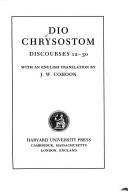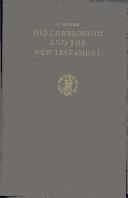| Listing 1 - 5 of 5 |
Sort by
|

ISBN: 0674993748 0674993950 0674994140 0674994248 9780674992832 0674992830 9780674993747 9780674993952 9780674994140 9780674994249 0434993859 9780434993857 0434992577 9780434992577 0434993395 9780434993390 0434993581 9780434993581 043499376X 9780434993765 Year: 2005 Publisher: Cambridge (Mass.) : Harvard university press,
Abstract | Keywords | Export | Availability | Bookmark
 Loading...
Loading...Choose an application
- Reference Manager
- EndNote
- RefWorks (Direct export to RefWorks)
Dio Chrysostomus (c. 40-c. 120 CE) was a rhetorician hostile to philosophers, whose Discourses (or Orations) reflect political or moral concerns. What survives of his works make him prominent in the revival of Greek literature in the late first and early second century CE. Dio Cocceianus Chrysostomus, ca. 40-ca. 120 CE, of Prusa in Bithynia, Asia Minor, inherited with his brothers large properties and debts from his generous father Pasicrates. He became a skilled rhetorician hostile to philosophers. But in the course of his travels he went to Rome in Vespasian's reign (69-79) and was converted to Stoicism. Strongly critical of the emperor Domitian (81-96) he was about 82 banned by him from Italy and Bithynia and wandered in poverty, especially in lands north of the Aegean, as far as the Danube and the primitive Getae. In 97 he spoke publicly to Greeks assembled at Olympia, was welcomed at Rome by emperor Nerva (96-98), and returned to Prusa. Arriving again at Rome on an embassy of thanks about 98-99 he became a firm friend of emperor Trajan. In 102 he travelled to Alexandria and elsewhere. Involved in a lawsuit about plans to beautify Prusa at his own expense, he stated his case before the governor of Bithynia, Pliny the Younger, 111-112. The rest of his life is unknown. Nearly all of Dio's extant Discourses (or Orations) reflect political concerns (the most important of them dealing with affairs in Bithynia and affording valuable details about conditions in Asia Minor) or moral questions (mostly written in later life; they contain much of his best writing). Some philosophical and historical works, including one on the Getae, are lost. What survives of his achievement as a whole makes him prominent in the revival of Greek literature in the last part of the first century and the first part of the second. The Loeb Classical Library edition of Dio Chrysostom is in five volumes.
Speeches, addresses, etc., Greek --- Philosophy, Ancient. --- Rhetoric, Ancient. --- Speeches, addresses, etc., Greek. --- History and criticism --- Dio, --- Rome (Empire). --- Chrysostom, Dio --- Chrysostome --- Chrysostomos --- Dio Cocceianus, Chrysostomus, --- Dio Cocceianus, --- Dion, --- Dión, --- Diōn, --- Diōn Kokkeianos, --- Dione,

ISBN: 0674779150 9780674779150 Year: 1978 Publisher: Cambridge (MA) ; London : Harvard University Press,
Abstract | Keywords | Export | Availability | Bookmark
 Loading...
Loading...Choose an application
- Reference Manager
- EndNote
- RefWorks (Direct export to RefWorks)
History of ancient Greece --- Dio Chrysostom --- Speeches, addresses, etc., Greek --- History and criticism --- Dio, --- Knowledge --- Rome --- History --- Historiography --- In literature --- Oratory, Ancient --- -Greek orations --- Greek speeches --- -Knowledge --- -Rome --- -Historiography. --- In literature. --- Oratory, Ancient. --- History and criticism. --- Rome. --- Historiography. --- -History and criticism --- Chrysostom, Dio --- Chrysostome --- Chrysostomos --- Dio Cocceianus, Chrysostomus, --- Dio Cocceianus, --- Dion, --- Dión, --- Diōn, --- Diōn Kokkeianos, --- Dione, --- Rim --- Roman Empire --- Roman Republic (510-30 B.C.) --- Romi (Empire) --- Byzantine Empire --- Rome (Italy) --- Speeches, addresses, etc., Greek - History and criticism --- Dio, - Chrysostom - Knowledge - Rome --- Rome - History - Domitian, 81-96 - Historiography --- Rome - In literature --- Dio Chrysostomus --- Crisostomo, Dione --- Di Prusa, Dione --- Dion Chrysostomos --- Dion von Prusa --- Dion de Pruse --- Dio, - Chrysostom
Book
ISBN: 2251605207 9782251605203 Year: 1994 Volume: 520 129 Publisher: Paris : Les Belles Lettres,
Abstract | Keywords | Export | Availability | Bookmark
 Loading...
Loading...Choose an application
- Reference Manager
- EndNote
- RefWorks (Direct export to RefWorks)
Speeches, addresses, etc., Greek --- Discours grecs --- Translations into French --- Traductions françaises --- Dio, --- Dion chrysostome, --- Critique et interprétation --- Translations into French. --- -Greek orations --- Greek speeches --- Dio Chrysostom --- -Translations into French --- Bithynia --- -History --- -Sources --- Traductions françaises --- Critique et interprétation --- Greek orations --- Chrysostom, Dio --- Chrysostome --- Chrysostomos --- Dio Cocceianus, Chrysostomus, --- Dio Cocceianus, --- Dion, --- Dión, --- Diōn, --- Diōn Kokkeianos, --- Dione, --- History --- Sources. --- Bitinia --- Speeches, addresses, etc., Greek - Rome - Translations into French. --- Dio Chrysostomus --- Crisostomo, Dione --- Di Prusa, Dione --- Dion Chrysostomos --- Dion von Prusa --- Dion de Pruse

ISBN: 9004034056 9789004034051 Year: 1972 Volume: v. 2 Publisher: Leiden : E.J. Brill,
Abstract | Keywords | Export | Availability | Bookmark
 Loading...
Loading...Choose an application
- Reference Manager
- EndNote
- RefWorks (Direct export to RefWorks)
Dio, --- Bible. --- Criticism, Textual --- Speeches, addresses, etc, Greek --- Bible --- 225.08*9 --- Theologie van het Nieuw Testament: relatie met het hellenisme --- Speeches, addresses, etc., Greek --- Criticism, Textual. --- 225.08*9 Theologie van het Nieuw Testament: relatie met het hellenisme --- Greek orations --- Greek speeches --- Chrysostom, Dio --- Chrysostome --- Chrysostomos --- Dio Cocceianus, Chrysostomus, --- Dio Cocceianus, --- Dion, --- Dión, --- Diōn, --- Diōn Kokkeianos, --- Dione, --- Ba-yon Tipan --- Bagong Tipan --- Jaji ma Hungi --- Kainē Diathēkē --- New Testament --- Nouveau Testament --- Novo Testamento --- Novum Testamentum --- Novyĭ Zavet --- Novyĭ Zavi︠e︡t Gospoda nashego Īisusa Khrista --- Novyĭ Zavit --- Nuevo Testamento --- Nuovo Testamento --- Nye Testamente --- Perjanjian Baru --- Dhamma sacʻ kyamʻʺ --- Injīl --- Speeches, addresses, etc, Greek - Criticism, Textual --- Dio, - Chrysostom --- Dio Chrysostomus --- Crisostomo, Dione --- Di Prusa, Dione --- Dion Chrysostomos --- Dion von Prusa --- Dion de Pruse --- Criticism, interpretation, etc.
Book
ISBN: 1282715135 9786612715136 3110225875 9783110225877 9783110225860 3110225867 Year: 2009 Publisher: Berlin New York De Gruyter
Abstract | Keywords | Export | Availability | Bookmark
 Loading...
Loading...Choose an application
- Reference Manager
- EndNote
- RefWorks (Direct export to RefWorks)
Die Romaika Cassius Dios dienten bisher eher als Steinbruch zu Rekonstruktion verlorener Quellen und der Ereignisgeschichte. Diese Arbeit verknüpft die traditionelle "Quellenforschung" der Romaika des severischen Senators mit der Suche nach seiner Sicht der Römischen Republik, indem sie, angeleitet durch die Rezeptionsforschung und Cassius Dio selbst, die Kriterien seiner Quellenverarbeitung untersuchte: Ausgehend von Cassius Dios eigenen Schwerpunkten und denen der Forschung wurden seine Kommentare zu wichtigen Magistraturen betrachtet, seine "Analyse" der "Ständekämpfe", seine Einschätzung der Epochenjahre 218, 189 und 146 v. Chr. und seine Charakterisierungen Hannibals, der Africani und des Viriathus: Cassius Dio fügte in eine fortlaufende Erzählung, die er auch von den Annalisten Licinius Macer und Valerius Antias und der Monographie des Coelius Antipater bezog, Analysen, Urteile und Exempla insbesondere von Ulpian und Poseidonios ein. Das Ziel seiner Quellenverarbeitung bestand darin, im Sinne des Poseidonios das stoisch geprägte Ideal einer harmonischen Gemeinschaft, in der jeder (Führer) zum Wohle aller diente. Mit diesem Ideal hoffte Cassius Dio, seinen Zeitgenossen einen Weg aus der von ihm wahrgenommenen Krise des Reiches weisen zu können.
Emperors --- Biography --- History and criticism. --- Cassius Dio Cocceianus. --- Dio Cassius Cocceianus --- Dion Cassius Cocceianus --- Kasjusz Dion Kokcejan --- Cassio Dione --- Dione, Cassio --- Cassius Dio --- Kasij Dion --- Dion Cassius --- Dion Kasios Kokeianosi --- Lucio Cassio Dione --- Dio Cassius --- Casio, Dion --- Διων Κασσιος --- Διων Κασσιος Κοκκηιανος --- Diōn Kassios --- Diōn Kassios Kokkēianos --- Dio Cocceianus, Lucius Claudius Cassius --- Rome --- History. --- Cassius (Dio) Historia Romana --- Cassius Dio Cocceianus. Roman history --- Rome -- History -- Republic, 265-30 B.C --- Rome -- History -- Republic, 265-30 B.C. -- Historiography --- Regions & Countries - Europe --- Languages & Literatures --- Greek & Latin Languages & Literatures --- Italy --- History & Archaeology --- E-books --- Cassius Dio Cocceianus
| Listing 1 - 5 of 5 |
Sort by
|

 Search
Search Feedback
Feedback About UniCat
About UniCat  Help
Help News
News